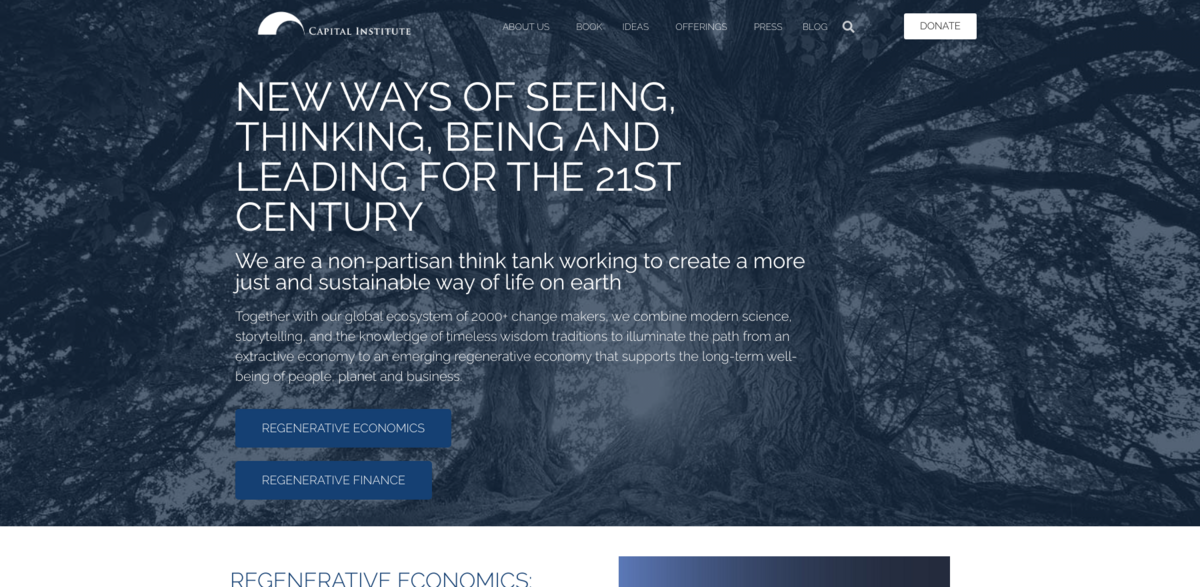What is the Capital Institute?
The Capital Institute is building the foundation for a regenerative economy. It’s not just another think tank or financial group; it’s a bold reimagining of how economies can work—rooted deeply in science, ethics, and a profound respect for nature. The Institute challenges the status quo, recognizing that the economic system that served the 20th century simply can’t carry us forward. Instead, it’s pioneering a new path—one that aligns finance and economics with the laws of nature and the wisdom traditions that have guided humanity for centuries.
Main Benefits of the Capital Institute’s Approach
Here’s what makes the Capital Institute’s work stand out:
- Draws on the latest science of living systems and global wisdom traditions.
- Over 20 years of real-world experience at the heart of global finance on Wall Street.
- Promotes a regenerative economic model that addresses climate change, economic injustice, and pandemics.
- Redefines wealth and finance to serve ecological and social regeneration.
- Supports thriving communities and a flourishing planet by tackling root causes, not just symptoms.
The Problem with Our Current Economic System
Despite its remarkable achievements during the last century, the current economic system is on shaky ground. The relentless push for exponential growth—capital, GDP, returns on investment—ignores a fundamental truth: our planet’s resources are finite. This isn’t just theory; it’s backed by the second law of thermodynamics. And ethically? Justice demands a systemic change. The current model’s narrow focus on infinite growth, without grounding in moral values or an understanding that humans are part of nature (not separate from it), is driving ecological collapse, widening wealth gaps, and global security crises. It’s a collision course that can’t be ignored.
The Capital Institute’s Solution
So, what’s the answer? The Capital Institute has carved out a new space for holistic economic thought. It’s a blend of cutting-edge science, ancient wisdom, and practical finance experience. The goal? To transform the economic system into one that regenerates—socially and ecologically. This means finance must serve life, not just profit. It means building an economy that respects natural laws and fosters compassion, echoing the values found in global wisdom traditions. The Institute envisions a Regenerative Economy that unlocks unseen potential, driven by individual genius and the deep purpose of regenerative enterprises, big and small. This isn’t just about business; it’s about reshaping the entire socio-economic system.
How the Capital Institute Works
The Institute’s work is powered by collaboration—bringing together a transdisciplinary network and entrepreneurs who are making the Regenerative Economy real on the ground. Their Field Guide to a Regenerative Economy is a rich ecosystem of stories designed to inspire others to join the movement. Plus, the Regenerative Communities Network supports bioregional initiatives worldwide. The Capital Institute balances groundbreaking thought leadership with deep analysis of successful regenerative models, sharing knowledge openly with partners and a growing global community. It’s a dynamic, evolving effort—always learning, always growing.
Impact on Sustainable Development Goals (SDGs)
- SDG 1: No Poverty – by promoting economic justice and reducing wealth gaps.
- SDG 8: Decent Work and Economic Growth – through regenerative economic models.
- SDG 10: Reduced Inequalities – addressing systemic economic injustice.
- SDG 12: Responsible Consumption and Production – aligning finance with natural laws.
- SDG 13: Climate Action – tackling root causes of climate change.
- SDG 15: Life on Land – supporting ecological regeneration.
- SDG 17: Partnerships for the Goals – fostering global collaboration and knowledge sharing.
Why the Regenerative Economy Matters Now
We’re at a crossroads. The old economic story—focused on endless growth and extraction—is no longer viable. The Capital Institute’s vision offers a fresh narrative, one that’s hopeful and practical. It’s about unleashing human creativity and purpose to build economies that heal rather than harm. This shift is urgent, yes, but it’s also inspiring. By embracing regenerative principles, communities can thrive, ecosystems can recover, and the planet can flourish. The Capital Institute isn’t just imagining this future—they’re actively building it, one story, one partnership, one innovation at a time.






















